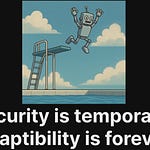(Like this article? Read more Wednesday Wisdom! No time to read? No worries! This article will also become available as a podcast on Thursday)
On another note: In honor of my darling wife’s birthday and our ten year anniversary, I have minted her her own crypto token: The Li$a. Want to become a Li$a millionaire? Send me your wallet address and I will send you a cool million.
Everywhere I go, there are things that are suboptimal. That’s not unexpected; the universe is a cold, dark and lonely place that was clearly not created for either our comfort or our convenience. Accompanying these suboptimalities are people who can explain in detail what is wrong with the world; newspapers and social media are full of them. But does all that talk help?
The people who are explaining all the world’s problems seem to operate under the assumption that people either do not know that the problem exists or that they don’t care. They are usually wrong about the first thing, but usually right about the second. However, in my experience, just explaining the problem does not help one iota.
Every morning, I wake up and read a high quality Dutch newspaper. And every morning, without fail, it is full of stories that describe something that is wrong with the world. Here is a selection of today’s picks: American scientists are not allowed to join an IPCC panel on climate change, one of our dumber ministers (and that is saying something these days), called Zelensky “not democratically elected”, our lame duck prime minister is powerless in Europe, female athletes who complain about harassment from their coaches are not listened to, kids spend too much time on TikTok, and one of our public broadcasting societies (VPRO, of which I used to be a member) is an inward focused mess. Here is what is quite rare though: Any talk about solutions. It is usually just a whole lot of complaining and then sometimes a vague call to action: Someone should do something! But what exactly should be done? And by whom?
Let’s take an example.
In Europe there is considerable worry about dependence on American firms for cloud-based services, especially by governments and government agencies. There are newspaper articles about this problem, blogs, policy briefs, LinkedIn posts, and even questions in parliament. And that is usually where it ends. There are big unrealistic vague calls to action and then the next thing we read is that the Dutch Internet domain registrar is planning to move a big part of their operation to AWS.
This problem is of course massive. First of all, there is no European cloud alternative that can provide a level of service that is anywhere near what Microsoft, Amazon, and Google can offer. Having worked at or with all three of these cloud providers, I can say with some confidence that suggestions that any current European provider can offer a competitive service are simply laughable. But, it is not physically impossible. Europe has the money and it definitely has the talent. Sure, it doesn’t help that some of their greatest talents have moved to the US or work for the Americans, but that can probably be overcome. It is a gargantuan task though and it is not at all clear that there exists enough willpower to solve it. I mean, after more than a decade of signals that it is really time to get more self-sufficient in defense and energy, the Europeans were still caught like deer in the headlights when Russia invaded Ukraine and more recently when Donald Trump got elected and immediately started rolling out his maffia-like “NATO as a protection racket” policies. If we cannot fix things that are that important, will we really get our act together when it comes to, I don’t know, running our own virtual machines?
And thus, after many articles that explain how really big and really pressing and really important the problem is, nothing happens. As we say in Holland: Everyone takes a leak and things continue as they were.
```
This sounds better in Dutch because it rhymes: Iedereen doet een plas en alles is weer zoals het was.
You can see this same lack of tangible action at work on much smaller scales too. Many teams that I joined in the past ran complicated infrastructures where there are lots of things going wrong. Things are on fire, customers complain, and the pager rings off the hook. In situations like this there is no shortage of people who can explain what the problem is. But, like with the big problems, everyone takes a leak, and things continue as they were.
I get it though. All of these problems are relatively huge, often complicated, without obvious solutions, and mostly not urgent, where “urgent” is defined as: Our comfortable existence will be upended tomorrow if we don’t fix this today. But because of this, we are stuck a bit in a loop of problems that are complained about but not solved unless they become so urgent that we need to drop everything and declare a code red, because eventually our comfortable existence will actually be under threat of ending on short notice.
The root cause of the paralysis that often follows the explanation of a huge problem is that these explanations are not accompanied by reasonable calls to action. For example: People worried about the dominance of US cloud providers tell everyone that our government should stop using Microsoft ‘s cloud solutions. That is quite simply not possible on short notice and it is not even possible to determine where to begin. The people who say it is possible clearly have no experience providing IT-solutions to large bureaucracies. The annals of IT history are littered with projects on a much smaller scale gone horribly wrong. Did anyone say Horizon? Or KEI? In a similar vein, people who say that a team should stop everything they are doing and attack some problem are equally unrealistic. The team has lots to do this quarter and pretty much no annoying and urgent problem is so annoying or so urgent that the team can afford to drop everything and refocus.
So, what to do?
First all, realize that problems that take decades to build up cannot be solved in years. Similarly, problems that were years in the making, cannot be solved in weeks. If it took decades to get to where we are, it will take decades to solve. That doesn’t mean we shouldn’t start today, but it does mean that we should be realistic in our goals for the short term.
Next: Most people truly underestimate the effects of work compounding over time. Much like compound interest, doing something and then keeping at it really leads to amazing results even after a relatively short amount of time. That’s why I advise teams that are in fire fighting mode not to drop everything, but instead to commit to spending a manageable amount of their time to solving something, anything, but also to keep at that quarter after quarter. Even if you consistently spend only 10-15% of your time solving the things that you can solve, that work really adds up.
There are other advantages of this approach too: By setting your goals at an attainable level, you increase people’s belief that this is something that can and eventually will be solved. That’s the kind of positivity that begets more positivity. You are not only solving things, you are also creating confidence that this is a problem that can and will be solved. So when the time comes for bigger or more painful investments, you have some work that you can point to that will inspire support for your program. Nobody is going to spend oodles of money on an ambitious project, but people will be ready to fund the next phase of a project that has been going on for a while and that has been delivering results.
For the European dependency on US cloud providers I suggest a similar approach. Getting rid of all US clouds for all services and all government agencies is of course an impossible project. So here is my suggestion: Start with email. Make a principled decision that you are going to switch all government email to a newly built European service. That’s not a comprehensive solution by any means, but it is a start, and one that I think is doable. It will probably take ten years or so, but it is something that is attainable. For all its importance as the backbone of government information exchange, email is mostly a solved problem. The technologies are well understood, there is ample software available, and wherever we are going in the future, email will probably play a part. Remember: The whole Google cloud started with GMail! So why not do the same.?Don’t get me wrong, it will still be a massive project, but if we can’t even do that, there is nothing left but total and utter despair 🙂.
So, don’t just complain about the status quo. Talk is cheap, always offer solutions too. They don’t have to be all encompassing and solve every possible problem, but propose something and get going.












